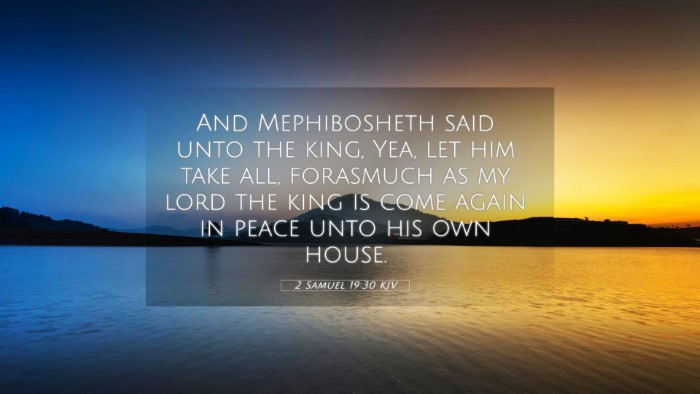Understanding 2 Samuel 19:30
2 Samuel 19:30 states: "And Mephibosheth said to the king, 'Let him take all, for as much as my lord the king has come safely home.'" This verse carries deep emotional and thematic significance, particularly concerning loyalty, gratitude, and the complexities of human relationships.
Verse Meaning
The context of this verse involves King David's return to Jerusalem following Absalom's rebellion. Mephibosheth, the son of Jonathan (David's close friend), expresses his joy upon the king's return, showcasing his loyalty and the bond he shares with David. This interaction raises important themes:
- Loyalty: Mephibosheth's willingness to forfeit his possessions signifies his profound loyalty to David.
- Grace and Restoration: David's restoration as king reflects God's grace, paralleling how He restores us despite our circumstances.
- The complexity of relationships: The underlying tension between David, Mephibosheth, and Ziba highlights the complexity in loyalty and betrayal.
Public Domain Commentary Insights
Drawing insights from notable public domain commentaries:
- Matthew Henry: He emphasizes Mephibosheth's humility and willingness to relinquish personal gains for the king's honor, suggesting true loyalty often prioritizes the welfare of others over self-interest.
- Albert Barnes: He adds that this verse illustrates the sincerity of Mephibosheth's character and his relationship with David, marking a contrast to Ziba’s reported actions.
- Adam Clarke: Clarke notes the importance of this moment, suggesting it reflects the themes of faithfulness and the acknowledgment of God's sovereign hand in the complex social dynamics of the kingdom.
Cross-References in the Bible
To enhance our understanding, we can explore several cross-references within the Bible that share thematic connections with 2 Samuel 19:30:
- 1 Samuel 18:1-3: The friendship between David and Jonathan establishes foundational loyalty.
- 2 Samuel 9:7: David's kindness to Mephibosheth shows the theme of grace and restoration.
- 2 Samuel 16:3: Insights into Ziba's deception can help us understand the relational tensions within this context.
- Matthew 5:23-24: Encouragement to reconcile and honor relationships resonates with David's restoration of Mephibosheth.
- Romans 12:10: The call for brotherly love echoes Mephibosheth’s expression of loyalty and selflessness.
- Philippians 2:3-4: A reminder to put others’ interests before our own; a principle embodied in Mephibosheth’s actions.
- Luke 6:31: The Golden Rule correlates with the ethos of loyalty and kindness demonstrated in this narrative.
Thematic Connections
This passage encourages us to ponder the purity of intentions behind acts of loyalty and service. Mephibosheth's actions can serve as a reminder of the importance of putting others first, mirroring Jesus' teachings on servanthood and love.
Practical Applications from 2 Samuel 19:30
Understanding Mephibosheth's attitude offers lessons for modern applications, such as:
- Embracing Humility: Recognizing the value of humility and selflessness in our relationships.
- Cultivating Loyalty: Building lasting relationships based on trust and loyalty towards friends and leaders.
- Promoting Grace: Reflecting God’s grace in our dealings with others, extending kindness even in adversarial situations.
Exploring Connections Between Biblical Texts
Through a comparative analysis of biblical verses, we gain enriching insights that unveil the rich tapestry of God’s Word:
- By examining 1 Samuel 20:14-15, we recognize Jonathan’s commitment to David, which continues in the next generation through Mephibosheth.
- Psalm 145:17 parallels the character attributes displayed in this narrative by highlighting goodness and grace.
- Observed in the Gospels, John 15:13 speaks to the essence of friendship and loyalty, echoing the deep ties within this text.
Conclusion
2 Samuel 19:30 is a compelling narrative that highlights profound truths about loyalty, grace, and complex human interactions. By applying themes from this verse and its cross-references, readers are equipped to embrace deeper spiritual truths and foster loyal relationships reflective of God’s love and grace.
Further Study Suggestions
For those interested in deeper examination, consider using Bible cross-referencing tools such as concordances and thematic study materials to explore further links and connections among biblical texts:
- Investigating similar biblical stories helps in understanding and applying biblical lessons in practical ways.
- Engaging with a Bible cross-reference guide can clarify relationships and themes present within scripture.
- Utilizing cross-referencing Bible study methods aids in revealing intricate relationships between passages and intensifying personal study.
By drawing on these insights and tools, believers can cultivate a deeper understanding of scripture and enrich their spiritual lives.





